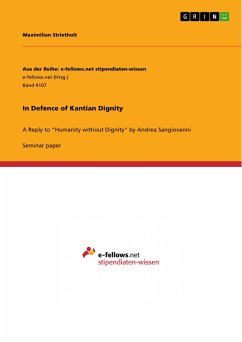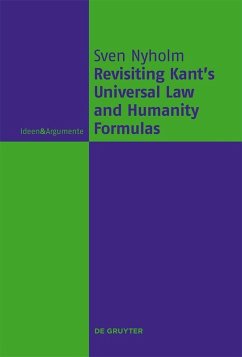
In Defence of Kantian Dignity (eBook, PDF)
A Reply to "Humanity without Dignity" by Andrea Sangiovanni
Versandkostenfrei!
Sofort per Download lieferbar
Statt: 15,95 €**
13,99 €
inkl. MwSt. und vom Verlag festgesetzt.
**Preis der gedruckten Ausgabe (Broschiertes Buch)
Alle Infos zum eBook verschenkenWeitere Ausgaben:

PAYBACK Punkte
0 °P sammeln!
Seminar paper from the year 2020 in the subject Philosophy - Philosophy of the present, grade: 1,0, University of Frankfurt (Main), language: English, abstract: In "Humanity without Dignity" Andrea Sangiovanni argues that we should abandon the idea of dignity as a basis of our commitment to moral equality and human rights. Sangiovanni considers two versions of the Kantian conception of dignity - the regress reading and the address reading - and argues that both of them fail to meet his desiderata. My argument, therefore, proceeds in four steps, each of which seeks to show that the Kantian conc...
Seminar paper from the year 2020 in the subject Philosophy - Philosophy of the present, grade: 1,0, University of Frankfurt (Main), language: English, abstract: In "Humanity without Dignity" Andrea Sangiovanni argues that we should abandon the idea of dignity as a basis of our commitment to moral equality and human rights. Sangiovanni considers two versions of the Kantian conception of dignity - the regress reading and the address reading - and argues that both of them fail to meet his desiderata. My argument, therefore, proceeds in four steps, each of which seeks to show that the Kantian conception of dignity can in fact meet Sangiovannis desiderata. In section 2.1., I will argue that Sangiovanni misrepresents not only Kant's own regress arguments, but also those of his scholars, and that his arguments therefore do not apply. Though my arguments are in this sense rather negative for large parts, I will try to deliver a positive argument by showing that Sangiovanni in fact has to concede that the regress argument can meet the rationale desideratum. In section 2.2., I contend that Sangiovanni does not sufficiently accommodate the idea of transcendental freedom - that is, the idea that we have to presuppose from a practical point of view that we are free and hence can act morally. As I will try to show, this also shows why the regress reading can meet the equality desideratum. Following this, we turn to the address reading of the Kantian conception of dignity. Here, I will argue that address Kantians can coherently claim that we are owed a justification for however anyone interacts with us, and hence can meet the rationale desideratum (section 3.1.). Finally, I will contend that the address reading can - as opposed to Sangiovanni's argument - rule out most cases of slavery (section 3.2.).
Dieser Download kann aus rechtlichen Gründen nur mit Rechnungsadresse in A, B, BG, CY, CZ, D, DK, EW, E, FIN, F, GR, HR, H, IRL, I, LT, L, LR, M, NL, PL, P, R, S, SLO, SK ausgeliefert werden.













